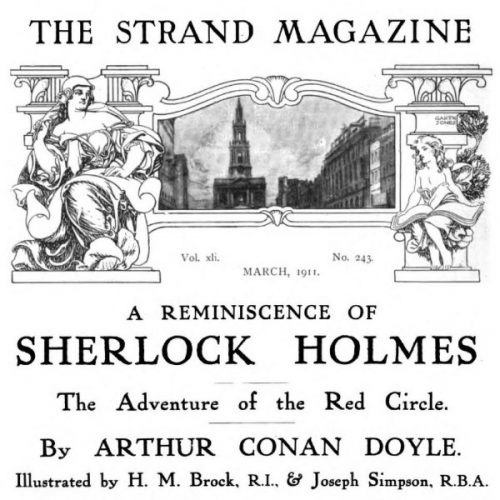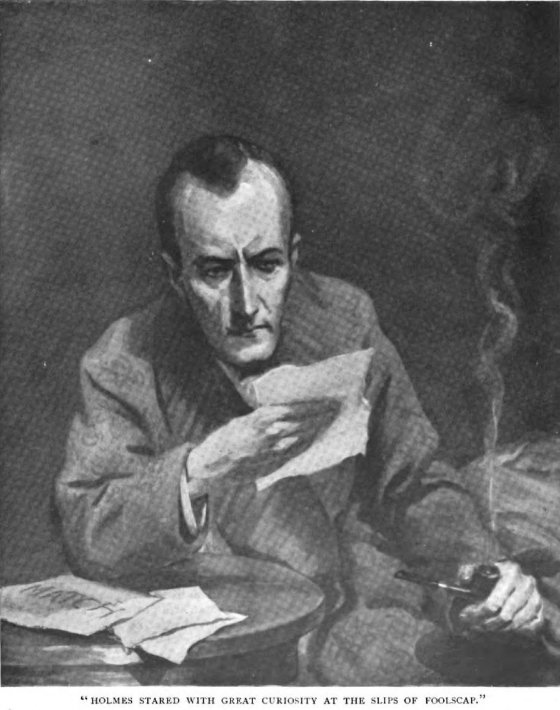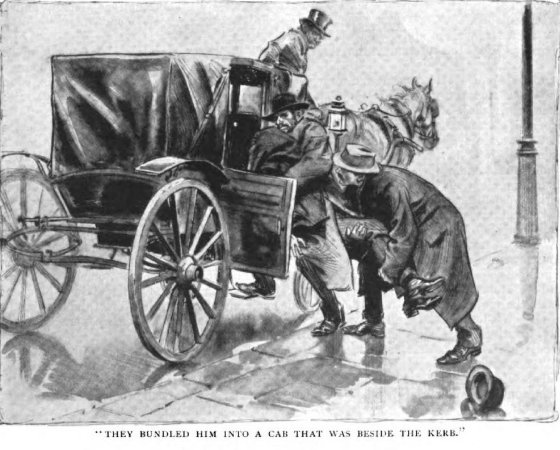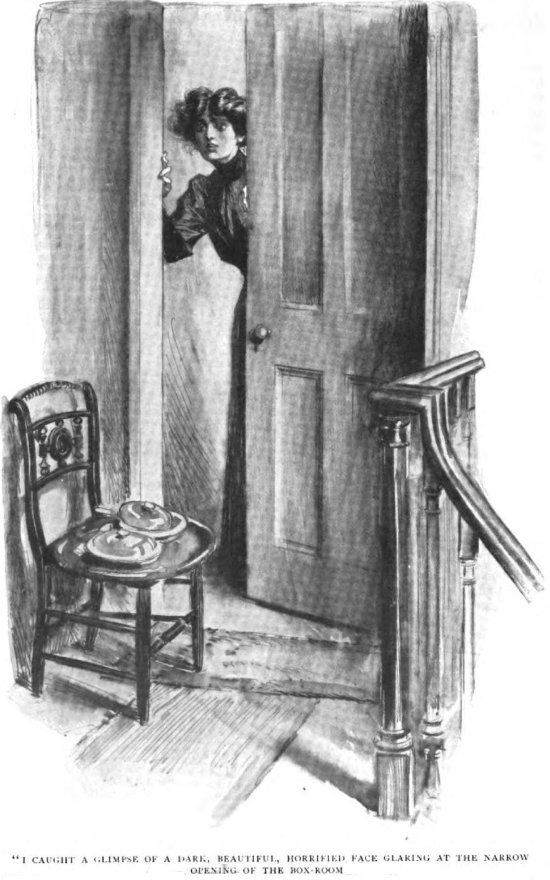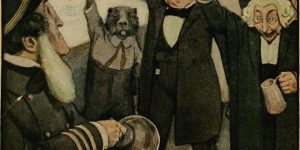A. C. Doyle – The Adventure of the Red Circle : Sherlock Holmes
The Adventure of the Red Circle : His Last Bow : Some Reminiscences of Sherlock Holmes by Arthur Conan Doyle
The Adventure of the Red Circle
by
Sir Arthur Conan Doyle
The Adventure of the Red Circle Contents
The Adventure of the Red Circle Part I
The Adventure of the Red Circle Part II
The Adventure of the Red Circle Part I
“Well, Mrs. Warren, I cannot see that you have any particular cause for uneasiness, nor do I understand why I, whose time is of some value, should interfere in the matter. I really have other things to engage me.” So spoke Sherlock Holmes and turned back to the great scrapbook in which he was arranging and indexing some of his recent material.
But the landlady had the pertinacity and also the cunning of her sex. She held her ground firmly.
“You arranged an affair for a lodger of mine last year,” she said–“Mr. Fairdale Hobbs.”
“Ah, yes–a simple matter.”
“But he would never cease talking of it–your kindness, sir, and the way in which you brought light into the darkness. I remembered his words when I was in doubt and darkness myself. I know you could if you only would.”
Holmes was accessible upon the side of flattery, and also, to do him justice, upon the side of kindliness. The two forces made him lay down his gum-brush with a sigh of resignation and push back his chair.
“Well, well, Mrs. Warren, let us hear about it, then. You don’t object to tobacco, I take it? Thank you, Watson–the matches! You are uneasy, as I understand, because your new lodger remains in his rooms and you cannot see him. Why, bless you, Mrs. Warren, if I were your lodger you often would not see me for weeks on end.”
“No doubt, sir; but this is different. It frightens me, Mr. Holmes. I can’t sleep for fright. To hear his quick step moving here and moving there from early morning to late at night, and yet never to catch so much as a glimpse of him–it’s more than I can stand. My husband is as nervous over it as I am, but he is out at his work all day, while I get no rest from it. What is he hiding for? What has he done? Except for the girl, I am all alone in the house with him, and it’s more than my nerves can stand.”
Holmes leaned forward and laid his long, thin fingers upon the woman’s shoulder. He had an almost hypnotic power of soothing when he wished. The scared look faded from her eyes, and her agitated features smoothed into their usual commonplace. She sat down in the chair which he had indicated.
“If I take it up I must understand every detail,” said he. “Take time to consider. The smallest point may be the most essential. You say that the man came ten days ago and paid you for a fortnight’s board and lodging?”
“He asked my terms, sir. I said fifty shillings a week. There is a small sitting-room and bedroom, and all complete, at the top of the house.”
“Well?”
“He said, ‘I’ll pay you five pounds a week if I can have it on my own terms.’ I’m a poor woman, sir, and Mr. Warren earns little, and the money meant much to me. He took out a ten-pound note, and he held it out to me then and there. ‘You can have the same every fortnight for a long time to come if you keep the terms,’ he said. ‘If not, I’ll have no more to do with you.’
“What were the terms?”
“Well, sir, they were that he was to have a key of the house. That was all right. Lodgers often have them. Also, that he was to be left entirely to himself and never, upon any excuse, to be disturbed.”
“Nothing wonderful in that, surely?”
“Not in reason, sir. But this is out of all reason. He has been there for ten days, and neither Mr. Warren, nor I, nor the girl has once set eyes upon him. We can hear that quick step of his pacing up and down, up and down, night, morning, and noon; but except on that first night he had never once gone out of the house.”
“Oh, he went out the first night, did he?”
“Yes, sir, and returned very late–after we were all in bed. He told me after he had taken the rooms that he would do so and asked me not to bar the door. I heard him come up the stair after midnight.”
“But his meals?”
“It was his particular direction that we should always, when he rang, leave his meal upon a chair, outside his door. Then he rings again when he has finished, and we take it down from the same chair. If he wants anything else he prints it on a slip of paper and leaves it.”
“Prints it?”
“Yes, sir; prints it in pencil. Just the word, nothing more. Here’s the one I brought to show you–soap. Here’s another–match. This is one he left the first morning–daily gazette. I leave that paper with his breakfast every morning.”
“Dear me, Watson,” said Homes, staring with great curiosity at the slips of foolscap which the landlady had handed to him, “this is certainly a little unusual. Seclusion I can understand; but why print? Printing is a clumsy process. Why not write? What would it suggest, Watson?”
“That he desired to conceal his handwriting.”
“But why? What can it matter to him that his landlady should have a word of his writing? Still, it may be as you say. Then, again, why such laconic messages?”
“I cannot imagine.”
“It opens a pleasing field for intelligent speculation. The words are written with a broad-pointed, violet-tinted pencil of a not unusual pattern. You will observe that the paper is torn away at the side here after the printing was done, so that the ‘s’ of ‘soap’ is partly gone. Suggestive, Watson, is it not?”
“Of caution?”
“Exactly. There was evidently some mark, some thumbprint, something which might give a clue to the person’s identity. Now. Mrs. Warren, you say that the man was of middle size, dark, and bearded. What age would he be?”
“Youngish, sir–not over thirty.”
“Well, can you give me no further indications?”
“He spoke good English, sir, and yet I thought he was a foreigner by his accent.”
“And he was well dressed?”
“Very smartly dressed, sir–quite the gentleman. Dark clothes–nothing you would note.”
“He gave no name?”
“No, sir.”
“And has had no letters or callers?”
“None.”
“But surely you or the girl enter his room of a morning?”
“No, sir; he looks after himself entirely.”
“Dear me! that is certainly remarkable. What about his luggage?”
“He had one big brown bag with him–nothing else.”
“Well, we don’t seem to have much material to help us. Do you say nothing has come out of that room–absolutely nothing?”
The landlady drew an envelope from her bag; from it she shook out two burnt matches and a cigarette-end upon the table.
“They were on his tray this morning. I brought them because I had heard that you can read great things out of small ones.”
Holmes shrugged his shoulders.
“There is nothing here,” said he. “The matches have, of course, been used to light cigarettes. That is obvious from the shortness of the burnt end. Half the match is consumed in lighting a pipe or cigar. But, dear me! this cigarette stub is certainly remarkable. The gentleman was bearded and moustached, you say?”
“Yes, sir.”
“I don’t understand that. I should say that only a clean-shaven man could have smoked this. Why, Watson, even your modest moustache would have been singed.”
“A holder?” I suggested.
“No, no; the end is matted. I suppose there could not be two people in your rooms, Mrs. Warren?”
“No, sir. He eats so little that I often wonder it can keep life in one.”
“Well, I think we must wait for a little more material. After all, you have nothing to complain of. You have received your rent, and he is not a troublesome lodger, though he is certainly an unusual one. He pays you well, and if he chooses to lie concealed it is no direct business of yours. We have no excuse for an intrusion upon his privacy until we have some reason to think that there is a guilty reason for it. I’ve taken up the matter, and I won’t lose sight of it. Report to me if anything fresh occurs, and rely upon my assistance if it should be needed.
“There are certainly some points of interest in this case, Watson,” he remarked when the landlady had left us. “It may, of course, be trivial–individual eccentricity; or it may be very much deeper than appears on the surface. The first thing that strikes one is the obvious possibility that the person now in the rooms may be entirely different from the one who engaged them.”
“Why should you think so?”
“Well, apart from this cigarette-end, was it not suggestive that the only time the lodger went out was immediately after his taking the rooms? He came back–or someone came back–when all witnesses were out of the way. We have no proof that the person who came back was the person who went out. Then, again, the man who took the rooms spoke English well. This other, however, prints ‘match’ when it should have been ‘matches.’ I can imagine that the word was taken out of a dictionary, which would give the noun but not the plural. The laconic style may be to conceal the absence of knowledge of English. Yes, Watson, there are good reasons to suspect that there has been a substitution of lodgers.”
“But for what possible end?”
“Ah! there lies our problem. There is one rather obvious line of investigation.” He took down the great book in which, day by day, he filed the agony columns of the various London journals. “Dear me!” said he, turning over the pages, “what a chorus of groans, cries, and bleatings! What a rag-bag of singular happenings! But surely the most valuable hunting-ground that ever was given to a student of the unusual! This person is alone and cannot be approached by letter without a breach of that absolute secrecy which is desired. How is any news or any message to reach him from without? Obviously by advertisement through a newspaper. There seems no other way, and fortunately we need concern ourselves with the one paper only. Here are the Daily Gazette extracts of the last fortnight. ‘Lady with a black boa at Prince’s Skating Club’–that we may pass. ‘Surely Jimmy will not break his mother’s heart’–that appears to be irrelevant. ‘If the lady who fainted on Brixton bus’–she does not interest me. ‘Every day my heart longs–‘ Bleat, Watson–unmitigated bleat! Ah, this is a little more possible. Listen to this: ‘Be patient. Will find some sure means of communications. Meanwhile, this column. G.’ That is two days after Mrs. Warren’s lodger arrived. It sounds plausible, does it not? The mysterious one could understand English, even if he could not print it. Let us see if we can pick up the trace again. Yes, here we are–three days later. ‘Am making successful arrangements. Patience and prudence. The clouds will pass. G.’ Nothing for a week after that. Then comes something much more definite: ‘The path is clearing. If I find chance signal message remember code agreed–One A, two B, and so on. You will hear soon. G.’ That was in yesterday’s paper, and there is nothing in to-day’s. It’s all very appropriate to Mrs. Warren’s lodger. If we wait a little, Watson, I don’t doubt that the affair will grow more intelligible.”
So it proved; for in the morning I found my friend standing on the hearthrug with his back to the fire and a smile of complete satisfaction upon his face.
“How’s this, Watson?” he cried, picking up the paper from the table. “‘High red house with white stone facings. Third floor. Second window left. After dusk. G.’ That is definite enough. I think after breakfast we must make a little reconnaissance of Mrs. Warren’s neighbourhood. Ah, Mrs. Warren! what news do you bring us this morning?”
Our client had suddenly burst into the room with an explosive energy which told of some new and momentous development.
“It’s a police matter, Mr. Holmes!” she cried. “I’ll have no more of it! He shall pack out of there with his baggage. I would have gone straight up and told him so, only I thought it was but fair to you to take your opinion first. But I’m at the end of my patience, and when it comes to knocking my old man about–”
“Knocking Mr. Warren about?”
“Using him roughly, anyway.”
“But who used him roughly?”
“Ah! that’s what we want to know! It was this morning, sir. Mr. Warren is a timekeeper at Morton and Waylight’s, in Tottenham Court Road. He has to be out of the house before seven. Well, this morning he had not gone ten paces down the road when two men came up behind him, threw a coat over his head, and bundled him into a cab that was beside the curb. They drove him an hour, and then opened the door and shot him out. He lay in the roadway so shaken in his wits that he never saw what became of the cab. When he picked himself up he found he was on Hampstead Heath; so he took a bus home, and there he lies now on his sofa, while I came straight round to tell you what had happened.”
“Most interesting,” said Holmes. “Did he observe the appearance of these men–did he hear them talk?”
“No; he is clean dazed. He just knows that he was lifted up as if by magic and dropped as if by magic. Two at least were in it, and maybe three.”
“And you connect this attack with your lodger?”
“Well, we’ve lived there fifteen years and no such happenings ever came before. I’ve had enough of him. Money’s not everything. I’ll have him out of my house before the day is done.”
“Wait a bit, Mrs. Warren. Do nothing rash. I begin to think that this affair may be very much more important than appeared at first sight. It is clear now that some danger is threatening your lodger. It is equally clear that his enemies, lying in wait for him near your door, mistook your husband for him in the foggy morning light. On discovering their mistake they released him. What they would have done had it not been a mistake, we can only conjecture.”
“Well, what am I to do, Mr. Holmes?”
“I have a great fancy to see this lodger of yours, Mrs. Warren.”
“I don’t see how that is to be managed, unless you break in the door. I always hear him unlock it as I go down the stair after I leave the tray.”
“He has to take the tray in. Surely we could conceal ourselves and see him do it.”
The landlady thought for a moment.
“Well, sir, there’s the box-room opposite. I could arrange a looking-glass, maybe, and if you were behind the door–”
“Excellent!” said Holmes. “When does he lunch?”
“About one, sir.”
“Then Dr. Watson and I will come round in time. For the present, Mrs. Warren, good-bye.”
At half-past twelve we found ourselves upon the steps of Mrs. Warren’s house–a high, thin, yellow-brick edifice in Great Orme Street, a narrow thoroughfare at the northeast side of the British Museum. Standing as it does near the corner of the street, it commands a view down Howe Street, with its more pretentious houses. Holmes pointed with a chuckle to one of these, a row of residential flats, which projected so that they could not fail to catch the eye.
“See, Watson!” said he. “‘High red house with stone facings.’ There is the signal station all right. We know the place, and we know the code; so surely our task should be simple. There’s a ‘to let’ card in that window. It is evidently an empty flat to which the confederate has access. Well, Mrs. Warren, what now?”
“I have it all ready for you. If you will both come up and leave your boots below on the landing, I’ll put you there now.”
It was an excellent hiding-place which she had arranged. The mirror was so placed that, seated in the dark, we could very plainly see the door opposite. We had hardly settled down in it, and Mrs. Warren left us, when a distant tinkle announced that our mysterious neighbour had rung. Presently the landlady appeared with the tray, laid it down upon a chair beside the closed door, and then, treading heavily, departed. Crouching together in the angle of the door, we kept our eyes fixed upon the mirror. Suddenly, as the landlady’s footsteps died away, there was the creak of a turning key, the handle revolved, and two thin hands darted out and lifted the tray from the chair. An instant later it was hurriedly replaced, and I caught a glimpse of a dark, beautiful, horrified face glaring at the narrow opening of the box-room. Then the door crashed to, the key turned once more, and all was silence. Holmes twitched my sleeve, and together we stole down the stair.
“I will call again in the evening,” said he to the expectant landlady. “I think, Watson, we can discuss this business better in our own quarters.”
“My surmise, as you saw, proved to be correct,” said he, speaking from the depths of his easy-chair. “There has been a substitution of lodgers. What I did not foresee is that we should find a woman, and no ordinary woman, Watson.”
“She saw us.”
“Well, she saw something to alarm her. That is certain. The general sequence of events is pretty clear, is it not? A couple seek refuge in London from a very terrible and instant danger. The measure of that danger is the rigour of their precautions. The man, who has some work which he must do, desires to leave the woman in absolute safety while he does it. It is not an easy problem, but he solved it in an original fashion, and so effectively that her presence was not even known to the landlady who supplies her with food. The printed messages, as is now evident, were to prevent her sex being discovered by her writing. The man cannot come near the woman, or he will guide their enemies to her. Since he cannot communicate with her direct, he has recourse to the agony column of a paper. So far all is clear.”
“But what is at the root of it?”
“Ah, yes, Watson–severely practical, as usual! What is at the root of it all? Mrs. Warren’s whimsical problem enlarges somewhat and assumes a more sinister aspect as we proceed. This much we can say: that it is no ordinary love escapade. You saw the woman’s face at the sign of danger. We have heard, too, of the attack upon the landlord, which was undoubtedly meant for the lodger. These alarms, and the desperate need for secrecy, argue that the matter is one of life or death. The attack upon Mr. Warren further shows that the enemy, whoever they are, are themselves not aware of the substitution of the female lodger for the male. It is very curious and complex, Watson.”
“Why should you go further in it? What have you to gain from it?”
“What, indeed? It is art for art’s sake, Watson. I suppose when you doctored you found yourself studying cases without thought of a fee?”
“For my education, Holmes.”
“Education never ends, Watson. It is a series of lessons with the greatest for the last. This is an instructive case. There is neither money nor credit in it, and yet one would wish to tidy it up. When dusk comes we should find ourselves one stage advanced in our investigation.”
When we returned to Mrs. Warren’s rooms, the gloom of a London winter evening had thickened into one gray curtain, a dead monotone of colour, broken only by the sharp yellow squares of the windows and the blurred haloes of the gas-lamps. As we peered from the darkened sitting-room of the lodging-house, one more dim light glimmered high up through the obscurity.
“Someone is moving in that room,” said Holmes in a whisper, his gaunt and eager face thrust forward to the window-pane. “Yes, I can see his shadow. There he is again! He has a candle in his hand. Now he is peering across. He wants to be sure that she is on the lookout. Now he begins to flash. Take the message also, Watson, that we may check each other. A single flash–that is A, surely. Now, then. How many did you make it? Twenty. So did I. That should mean T. AT–that’s intelligible enough. Another T. Surely this is the beginning of a second word. Now, then–TENTA. Dead stop. That can’t be all, Watson? ATTENTA gives no sense. Nor is it any better as three words AT, TEN, TA, unless T. A. are a person’s initials. There it goes again! What’s that? ATTE–why, it is the same message over again. Curious, Watson, very curious. Now he is off once more! AT–why he is repeating it for the third time. ATTENTA three times! How often will he repeat it? No, that seems to be the finish. He has withdrawn from the window. What do you make of it, Watson?”
“A cipher message, Holmes.”
My companion gave a sudden chuckle of comprehension. “And not a very obscure cipher, Watson,” said he. “Why, of course, it is Italian! The A means that it is addressed to a woman. ‘Beware! Beware! Beware!’ How’s that, Watson?
“I believe you have hit it.”
“Not a doubt of it. It is a very urgent message, thrice repeated to make it more so. But beware of what? Wait a bit, he is coming to the window once more.”
Again we saw the dim silhouette of a crouching man and the whisk of the small flame across the window as the signals were renewed. They came more rapidly than before–so rapid that it was hard to follow them.
“PERICOLO–pericolo–eh, what’s that, Watson? ‘Danger,’ isn’t it? Yes, by Jove, it’s a danger signal. There he goes again! PERI. Halloa, what on earth–”
The light had suddenly gone out, the glimmering square of window had disappeared, and the third floor formed a dark band round the lofty building, with its tiers of shining casements. That last warning cry had been suddenly cut short. How, and by whom? The same thought occurred on the instant to us both. Holmes sprang up from where he crouched by the window.
“This is serious, Watson,” he cried. “There is some devilry going forward! Why should such a message stop in such a way? I should put Scotland Yard in touch with this business–and yet, it is too pressing for us to leave.”
“Shall I go for the police?”
“We must define the situation a little more clearly. It may bear some more innocent interpretation. Come, Watson, let us go across ourselves and see what we can make of it.”

